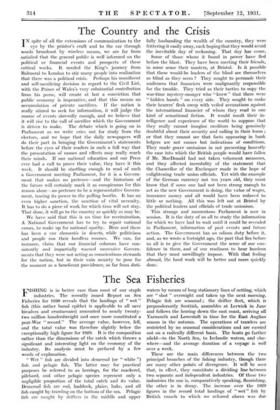The Country and the Crisis
IN spite of all the extensions of communication to the eye by the printer's craft and to the ear through words broadcast by wireless means, we are far from satisfied that the general public is well informed on the political or financial events and prospects of these critical weeks. It needed the King's journey from Balmoral to London to stir many people into realization that there was a political crisis. Perhaps his munificent and self-sacrificing decision in regard to the Civil List, with the Prince of Wales's very substantial contribution from his purse, will create at last a conviction that public economy is imperative, and that this means an accumulation of private sacrifices. If the nation is really stirred to seek for information, it will judge the course of events shrewdly enough, and we believe that it will rise to the call of sacrifice which the Government is driven to make. The debate which is going on in Parliament as we write cries out for study from the electors, and we hope that the daily newspapers will do their part in bringing the Government's statements before the eyes of their readers in such a full way that the presentation of causes and effects may really reach their minds. If our national education and our Press ever had a call to prove their value, they have it this week. It should be startling enough to read of such a Government meeting Parliament, for it is a Govern- ment that makes no pretence—and the historians of the future will certainly mark it as conspicuous for this reason alone—no pretence to be a representative Govern- ment, tracing its power to the polling booths. It has an even higher sanction, the sanction of vital necessity. It has to do a piece of work for which time will not stay. That done, it will go to the country as quickly as may be.
We have said that this is no time for recrimination. A National Government has to try to repair national errors, to make up for national apathy. Here and there has been a vox clamantis in deserto, while politicians and people ran their heedless courses. We can, for instance, claim that our financial columns have con- sistently and impartially warned successive Govern. ments that they were not acting as conscientious stewards for the nation, but in their vain anxiety to pose for the moment as a beneficent providence, so far from duti- fully husbanding the wealth of the country, they were frittering it easily away, each hoping that they would avoid the inevitable day of reckoning. That day has come.
Some of those whom it found in power have fled before the blast. They have been meeting their friends, in some sense their masters, at Bristol. Is it possible that these would-be leaders of the blind are- themselves as blind as they seem ? They sought to persuade their audiences that financiers were malignantly responsible for the trouble. They tried as their tactics to copy the war-time mystery-monger who " knew " that there were " hidden hands " on every side. They sought to make their hearers' flesh creep with veiled accusations-against the international financier of whom they read in one kind of sensational fiction. It would insult their in- telligence and experience of the world to suppose that they really cannot imagine creditors being genuinely doubtful about their security and calling in their loans ; or that they cannot see that facts appearing in bank ledgers are not causes but indications of conditions. They made grave omissions in not presenting honestly the ease into which the British people would have fallen if Mr. MacDonald had not taken vehement measures, and they affected incredulity of the statement that the Chancellor of the Exchequer made in the hope of enlightening trade union officials. Yet with the example of the German currency not ten years old, they must know that if some one had not been strong enough to act as the new Government is doing, the value of wages, insurance money and all would have been reduced to little or nothing. All this was left out at Bristol by the political leaders and officials of trade unionism.
This strange and momentous Parliament is now in session. It is the duty of us all to study the information for which we have had to wait until it could be revealed in Parliament, information of past events and future action. The Government has an odious duty before it, and, as we wrote a fortnight ago, the part that lies before us all is to give the Government the sense of our con- fidence in them, and of our readiness to bear burdens that they must unwillingly impose. With that feeling abroad, the hard work will be better and more quickly done.






























 Previous page
Previous page